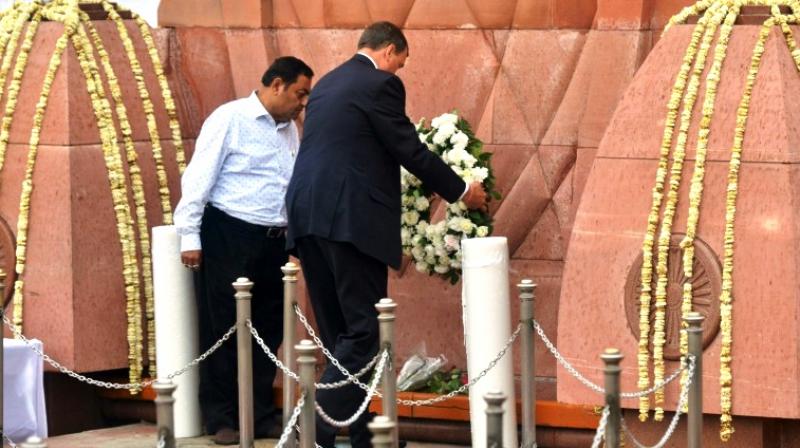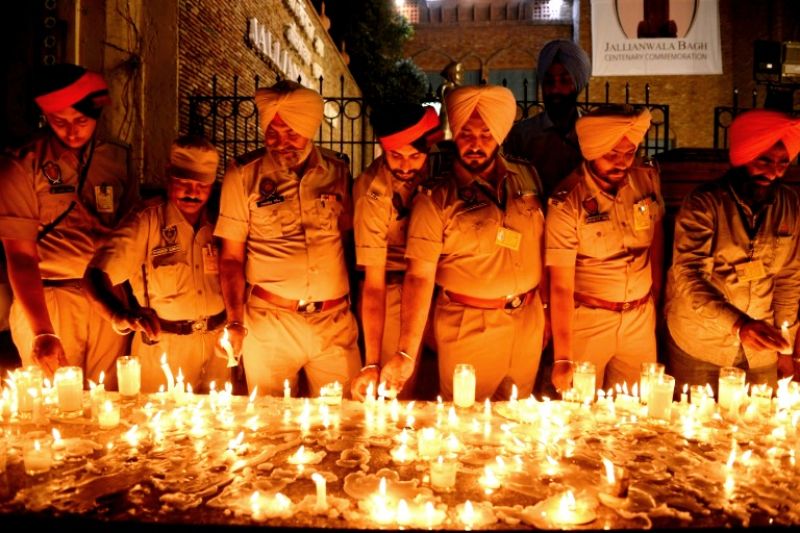Britain refuses to apologise for Jallianwala Bagh massacre
Britain\'s high commissioner to India laid a wreath on the 100th anniversary of the massacre, for which London is still to apologise.

Amritsar: The Jallianwala Bagh massacre, as it is known in India, saw British troops fire on thousands of unarmed people in the northern city of Amritsar on the afternoon of April 13, 1919. The number of casualties from the event, which hardened opposition to colonial rule, is unclear, with colonial-era records showing about 400 deaths, while Indian figures put the number of fatalities closer to 1,000.
Even 100 years on, Britain has still made no official apology and Dominic Asquith, high commissioner, on Saturday followed suit at the Jallianwala Bagh walled garden where the massacre happened and where bullet marks are still visible. “You might want to re-write history, as the Queen said, but you can't," Asquith said.
"What you can do, as the Queen said, is to learn the lessons of history. I believe strongly we are. There is no question that we will always remember this. We will never forget what happened here," he added. Former British Prime Minister David Cameron described what happened as "deeply shameful" during a 2013 visit but stopped short of an apology.
 The chief minister of Punjab state said thousands attended a candlelight march Friday in memory of the victims. (Photo: AFP)
The chief minister of Punjab state said thousands attended a candlelight march Friday in memory of the victims. (Photo: AFP)
In 1997, Queen Elizabeth II laid a wreath at the site but her gaffe-prone husband Prince Philip stole the headlines by reportedly saying that Indian estimates for the death count were "vastly exaggerated". On Wednesday, British Prime Minister Theresa May told the House of Commons that the massacre was "a shameful scar on British Indian history". "We deeply regret what happened and the suffering caused," May said, but she, too, avoided saying she was sorry.
Amarinder Singh, chief minister of Punjab state, said May's words were not enough. He said "an unequivocal official apology" is needed for the "monumental barbarity". Singh made his comments on Twitter, where pictures showed him greeting opposition Congress party leader Rahul Gandhi in Amritsar on the eve of the centenary.
Singh said thousands attended a candlelight march Friday in memory of the victims ahead of a commemoration ceremony later on Saturday. Around 10,000 unarmed men, women and children had gathered in the Jallianwala Bagh walled public garden in Amritsar on the afternoon of April 13, 1919. Many were angry about the recent extension of repressive measures and the arrest of two local leaders that had sparked violent protests three days before.
The 13th of April was also a big spring festival, and the crowd estimated by some at 20,000 included pilgrims visiting the nearby Golden Temple sacred to Sikhs. Brigadier General Reginald Edward Harry Dyer arrived with dozens of troops, sealed off the exit and without warning ordered the soldiers to open fire. Many tried to escape by scaling the high walls surrounding the area. Others jumped into a deep, open well at the site as the troops fired.
Dyer, dubbed "The Butcher of Amritsar", said later it was a necessary measure and that the firing was "not to disperse the meeting but to punish the Indians for disobedience". Indian newspapers this week repeated their calls for an apology for a massacre that Winston Churchill, then secretary of state for war, called "monstrous".
"Over the years, there has been a growing demand from many, including several British historians, parliamentarians and Indian political parties, for the British government to formally apologise in parliament and commemorate the Jallianwala Bagh massacre with a memorial day," the Hindustan Times said in an editorial. "But even in the centenary year of the massacre, Britain has refused to… take that important step," it said. May's statement was "perhaps qualitatively a notch stronger... but is far from enough."

